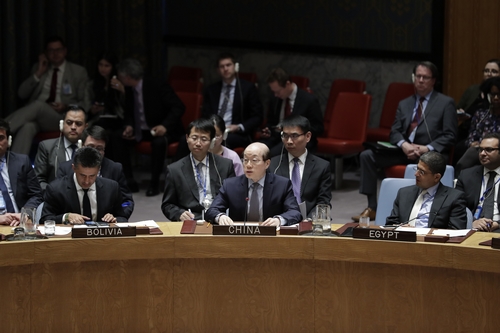| Statement by Ambassador LIU Jieyi at the Security Council Briefing on Human Rights and Prevention of Armed Conflict |
| 2017-04-18 03:51 |
|
At the outset, I wish to thank Secretary-General Guterres for his briefing today. Conflict prevention and resolution are the sacred responsibility entrusted to the Security Council by the Charter of the United Nations. Given the new developments in the international context, causes of conflicts across the world are becoming more complex and diverse, with different, intertwined factors. As a result, the ideas and means for conflict resolution must also evolve in order to be systematic, comprehensive and targeted. I wish to make the following observations. First, efforts should be focused on building a more favorable international environment for conflict prevention. The target for conflict prevention is to build a world with universal security. However, the security of individual countries is interdependent. No nation can seek absolute security on its own and no country can harvest stability from turmoil in other countries. All nations must establish the concept of a common, shared future and advocate for a global governance concept based on the principle of engaging wider consultation, making joint contributions and shared benefits in order to build a global partnership based on dialogue and partnership rather than confrontation and alliances. We need to insist on common, comprehensive, cooperative and sustainable security and carry it throughout the entire process of conflict prevention in order to build a favorable global environment for conflict prevention. It is necessary to coordinate and maintain security in conventional and non-conventional fields. We must advance sustainable security with sustainable development in order to eliminate the root causes of conflicts. Secondly, we feel that disputes among countries need to be addressed appropriately through dialogue and consultation. All countries need to abide by the principles and purposes of the Charter of the United Nations and follow the basic norms governing international relations, such as mutual respect for sovereignty and territorial integrity of nations, non-aggression and peaceful settlement of disputes. It is important to insist on good-neighborly relations, advocate inclusiveness and cooperation and effectively manage differences and conflicts in order to resolve disputes through peaceful means, such as dialogue and consultation. The goal of conflict prevention is to maintain peace and stability. Any non-peaceful means are undesirable. Thirdly, we should commit ourselves to addressing the root causes of conflicts. Conflicts have many deep-seated causes, such as extreme poverty, unbalanced development, shortage of resources and ethnic and tribal conflicts. Conflict prevention needs to put special emphasis on the root causes of conflict. All countries should make development their top priority and jointly forge ahead with the 2030 Agenda for Sustainable Development in order to realize the goal of eliminating poverty from the world at an early date and build capacities for autonomous development in order to provide impetus for conflict prevention. The international community should fully respect the wills of the countries involved, and prevent and resolve conflicts, with the countries involved taking the lead. The international community should provide constructive assistance for the political process and national reconciliation. We need to make greater efforts to promote civilizational and cultural exchanges that are diverse, harmonious, inclusive and all-embracing. We need to carry out dialogue and enhance mutual understanding in order to turn differences into driving forces for exchange and integration, rather than leave them as potential causes for conflict. In areas plagued by armed conflicts, the threat of terrorism is especially acute. The international community should strengthen the unified global counter-terrorism front and prioritize counter-terrorism cooperation on the international security agenda. Special measures need to be taken in order to prevent the erosion of peoples’ minds by the ideologies of terrorism and extremism, thereby eliminating breeding grounds for terrorism. Fourthly, we need to give full responsibility to regional and subregional organizations, as they have geographical, historical and cultural advantages. They know the regional circumstances and specific causes of conflicts best. The international community should support regional and subregional organizations in capitalizing on their advantages in order to play a greater role in conflict prevention in those regions. In recent years, African regional and subregional organizations, such as the African Union, have been committed to the joint self-development and improvement of African countries, and have actively carried out activities related to conflict prevention and pushed for African solutions to African issues. They have played a very active role in safeguarding peace and stability on the African continent. The United Nations should further strengthen its cooperation with regional and subregional organizations, such as the African Union, and provide more targeted assistance so as to allow them to play a greater and more unique role in dialogue, consultation, good offices and mediation to address the hotspot issues in Africa. (Photo by Li Muzi, Xinhua News Agency) |
| |||||||||||||
| |||||||||||||
